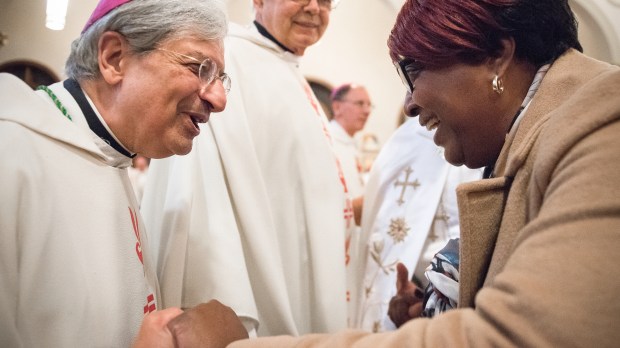Last January, as racial conflicts and community tensions continued to make headlines in the United States, the US Conference of Catholic Bishops acted to respond. Then-conference president Archbishop Joseph Kurtz established a Day of Prayer for Peace in Our Communities (celebrated on September 9, the feast of St Peter Claver), and convened a task force of bishops to study the problem of interracial conflicts in our communities and to make suggestions for how bishops might respond.
The task force, headed by Atlanta Archbishop Wilton Gregory, presented its findings at the November 2016 USCCB General Meeting. Those findings were released in final published form last week, and they offer food for thought, prayer, and action for all Catholics on this Martin Luther King, Jr, holiday.
It’s worth reading the brief report in its entirety, but today we’re highlighting the 5 specific recommendations the task force made for confronting and overcoming racial tensions in our communities. Although these recommendations are aimed specifically at bishops in their role as pastoral leaders, there are ways each of us can put these suggestions into effect in our own lives.
The task force called for:
- Prayer. “Prayer for peace in our communities is essential,” the task force insists. As individuals, in our families, and in our parishes, we can pray in solidarity with others and for greater openness and understanding among all people. Whether we are on the frontlines of racial tension or insulated from it by our circumstances, we suffer from the harm done to the Body of Christ. Let’s use the headlines as reminders to pray for and with all those whose peace is threatened by racism, injustice, and violence. As the task force reminds us, “these [times of prayer] can be powerful moments for encounter in God’s grace and mercy.”
- Conduct Local Dialogues – The task force reminded bishops that the Church’s power to convene conversations among community members is an invaluable tool. Conversations involve both talking and listening, and each of us can do a better job of this, in a more respectful way, on issues of racism (and other divisive topics). We can start by moving the conversation off social media, with its polarizing qualities, and into face-to-face encounters with people who differ from us. We can even start by conversing with ourselves. How much do I really know about this issue? How do I know it – by experience or by hearsay? How comfortable am I with the notion of hearing from those who disagree with me? If everyone I know looks, thinks, and acts like me, how can I widen my world to include more diversity?
- Parish‐based and Internal Diocesan Conversation and Training – The task force notes the important role parishes play “in building bridges and providing constructive forums for engagement by all people.” If our parishes are already engaged in such bridge-building (through discussion forums, community involvement, prayer, and social justice outreach, for example), we can choose to become more involved. If our parishes aren’t engaged in efforts to build community dialogue and peacemaking (most likely because resources are limited or no one has expressed a need for such engagement), we can volunteer to explore options.
- Foster Opportunities for Encounter – “Bishops can foster opportunities for themselves, their clergy, and the faithful to see firsthand the challenges within their own and others’ communities,” the task force recommends. Each of us can seek and respond to opportunities for encounter in our own lives. “Walking in another person’s shoes” – the practice of empathy and mercy that comes from meeting each person as a sister or brother – is how we build peace in our communities, one relationship at a time.
- Support for the Catholic Campaign for Human Development – The task force notes the importance of “empowering communities to identify and begin to address the challenges they are experiencing for themselves” as “an important step in community healing.” Funding provided through the Catholic Campaign for Human Development (CHD) has always had community empowerment as its goal. If you are sincerely convinced that CHD is “too political” for your support, give serious prayerful consideration to alternate ways to fund peace and development in your community.
As Archbishop Gregory wrote in his cover letter to the task force report, “The effort needed to root out racism and create healthy dynamics in our neighborhoods, dynamics based on encounter and deeper understanding, is a longterm project. Even so, we must not be intimidated or afraid of the hard work before us. The Church is at her absolute best when she is a bold and prophetic voice for the power of the love upon which our faith is based, the love of Jesus Christ.”
Let’s begin today.

